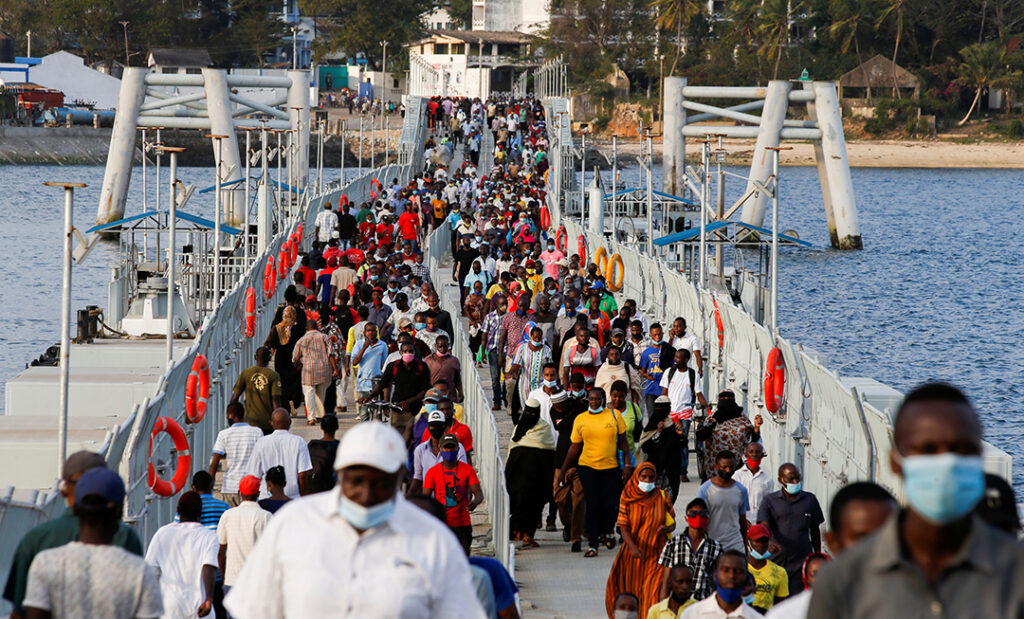ADF STAFF
Although the rate of new COVID-19 cases in Africa declined in mid-November, nine nations have experienced a fourth wave of coronavirus infections, the Africa Centres for Disease Control (Africa CDC) and Prevention reported.
Algeria, Benin, Burkina Faso, Egypt, Kenya, Mali, Mauritius, Somalia and Tunisia are battling a fourth wave, while officials in South Africa forecast a similar new wave of cases to hit the country in December or January.
Africa CDC Director Dr. John Nkengasong urged people not to grow complacent over containment measures.
“The number of cases decreases and stabilizes, then we see that they start coming up again after about two months,” Nkengasong said during a November 11 media briefing. “Let us be very mindful of that and not let our guards down and continue to implement public health measures. The testing on the continent has decreased. Over the last week, the continent recorded about 1 million new tests. This is the time to intensify the testing so we can predict the pockets of outbreaks and do something with them before they lead to a severe fourth wave.”
The continent recorded nearly 8.6 million COVID-19 cases and almost 222,000 deaths as of November 22, according to the Africa CDC.
Dr. Shem Otoi Sam, COVID-19 program coordinator for Kenya’s Lake Region Economic Bloc, said a fifth wave of infections could be on the horizon because many people are not practicing social distancing, wearing masks or practicing other preventive measures.
“We are dealing with a clever virus,” Sam told Kenyan newspaper Daily Nation. “If you relax a bit, it attacks and the way Kenyans are behaving now, it will attack so badly if we don’t take care.”
In Somalia, where Amnesty International criticized the government’s COVID-19 response as “wholly inadequate,” health experts say the disease has exacerbated poverty and hunger. Because the country has few testing laboratories, the true number of cases and deaths remain unknown.
Dr. Mohammed A.M. Ahmed, director of project advancement for medicine and health science at Mogadishu University, said most of the nation’s health care is privatized, concentrated in urban areas and poorly regulated.
“But I believe the private health sector can contribute to better access to health care if it’s operationalized, organized and regulated,” Ahmed said in an interview with nonprofit news organization The Conversation. “There is, therefore, a need to integrate health information between the two sectors. Without this numbers will continue to be under-reported.”
The Somali government formed a COVID-19 task force, initiated travel restrictions, ordered lockdowns and urged people to take preventive measures, but many suggestions were ignored “due to strong cultural or religious beliefs,” Ahmed said.
“For example, people continued to gather in mosques several times a day for prayers, and meet at funeral services without proper personal protective equipment,” he told The Conversation.
South African Health Minister Joe Phaahla said the country’s predicted fourth wave is not likely to be as severe as previous waves due to natural immunity.
“We want to do as much as we can in terms of social restrictions to avoid super spreading, but without taking away too much from the liberties of people socially and economically. So we will advise accordingly,” Phaahla told South Africa news website BusinessTech. “As we see the numbers currently, our advice from our epidemiologist is that this (increase in cases) is an isolated cluster that must be contained through contact tracing, quarantine and isolation, but at this stage, we must not panic.”

